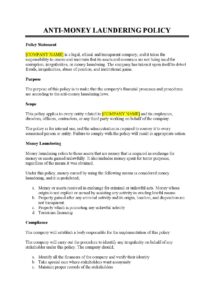In today’s increasingly complex financial landscape, accountants play a vital role in preventing money laundering and safeguarding the integrity of the financial system. An effective Anti-Money Laundering (AML) policy is essential for accountants to fulfill their professional responsibilities and protect themselves, their clients, and the public from the risks of financial crime. This comprehensive guide will provide accountants with a robust anti money laundering policy template, tailored to their specific needs, ensuring compliance with relevant regulations and industry best practices.
Accountants have a unique vantage point within the financial system, allowing them to detect suspicious transactions and activities that may indicate money laundering or other financial crimes. By implementing a robust AML policy, accountants can effectively manage and mitigate these risks, protecting the integrity of the financial system and demonstrating their commitment to ethical and professional conduct. Furthermore, a well-defined AML policy helps accountants maintain a strong reputation, fostering trust among clients and stakeholders.
Policy Objectives and Scope
Objective: The primary objective of this Anti-Money Laundering (AML) Policy is to establish a comprehensive framework for preventing, detecting, and reporting money laundering and other financial crimes within the accounting practice. This policy aims to safeguard the integrity of the financial system, protect the reputation of the accounting practice, and ensure compliance with relevant regulations and industry best practices.
Scope: This policy applies to all employees, contractors, and agents of the accounting practice, regardless of their role or position. It covers all aspects of the accounting practice’s operations, including but not limited to client onboarding, transaction monitoring, record-keeping, and reporting of suspicious activities.
Roles and Responsibilities
Designated Anti-Money Laundering Officer (DAML Officer): The DAML Officer is responsible for overseeing the implementation and enforcement of this AML Policy. The DAML Officer will ensure compliance with relevant regulations and industry best practices, monitor suspicious activity reports (SARs), conduct ongoing risk assessments, and provide training to employees on AML procedures.
Employee Responsibilities: All employees are required to comply with this AML Policy and to report any suspicious activities or transactions to the DAML Officer immediately. Employees must undergo regular training on AML procedures and remain updated on regulatory changes and industry best practices.
Client Due Diligence and Risk Assessment
Client Onboarding: Prior to accepting a new client, the accounting practice will conduct comprehensive due diligence procedures, including identity verification, background checks, and assessment of the client’s business purpose and risk profile. Enhanced due diligence procedures will be applied to high-risk clients or transactions.
Ongoing Monitoring: The accounting practice will continuously monitor client transactions and activities for suspicious patterns or behaviors. This includes monitoring for large cash transactions, frequent wire transfers, and transactions involving countries or individuals known for high money laundering risk.
Record-Keeping and Reporting
Record-Keeping: The accounting practice will maintain accurate and complete records of all client transactions and activities for a period of at least five years. These records will include client identification information, transaction details, and any supporting documentation.
Suspicious Activity Reporting (SAR): The accounting practice will promptly report any suspicious transactions or activities to the relevant financial intelligence unit (FIU) in accordance with applicable regulations. The DAML Officer will review all SARs and ensure that they are filed correctly and in a timely manner.
Conclusion
By implementing this comprehensive anti money laundering policy template, accountants can effectively mitigate the risks of money laundering and other financial crimes, protect the integrity of the financial system, and demonstrate their commitment to ethical and professional conduct. A robust AML policy not only safeguards the reputation of the accounting practice but also fosters trust among clients and stakeholders, positioning the practice as a leader in the fight against financial crime.
Accountants play a crucial role in combating money laundering and ensuring the integrity of the financial system. By adhering to this AML policy, accountants can fulfill their professional responsibilities, protect themselves and their clients from financial crime, and contribute to a safer and more transparent financial landscape.
FAQs
What is the purpose of an AML policy for accountants?
An AML policy for accountants establishes a comprehensive framework for preventing, detecting, and reporting money laundering and other financial crimes within the accounting practice, ensuring compliance with regulations and industry best practices.
Who is responsible for implementing and enforcing the AML policy?
The Designated Anti-Money Laundering Officer (DAML Officer) is responsible for overseeing the implementation and enforcement of the AML policy, ensuring compliance, monitoring suspicious activity reports, conducting risk assessments, and providing training to employees.
What are the key elements of an effective AML policy for accountants?
Key elements of an effective AML policy include client due diligence and risk assessment, ongoing monitoring of transactions and activities, record-keeping and reporting, and training and awareness for employees.

